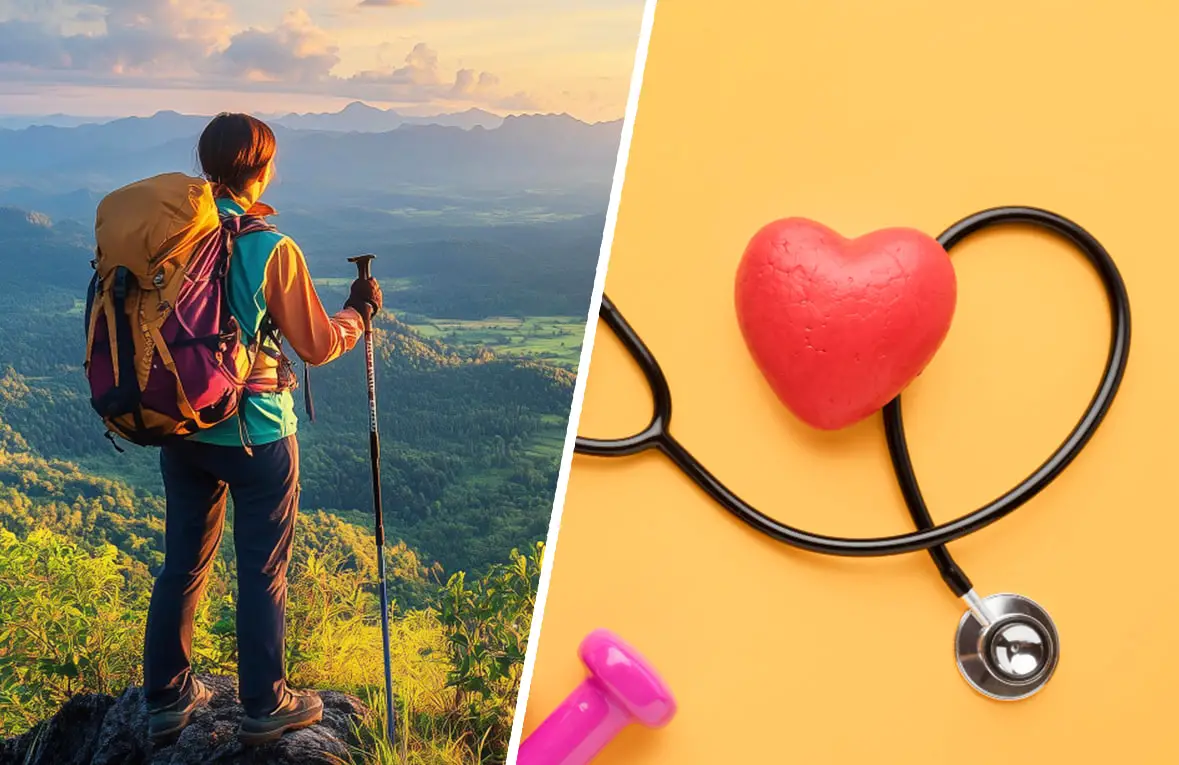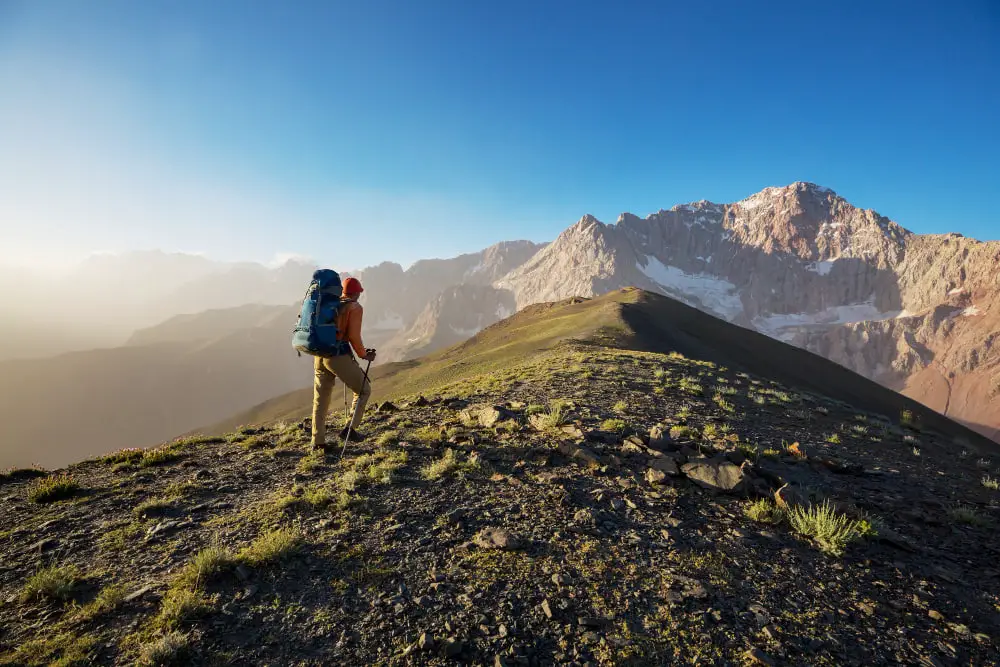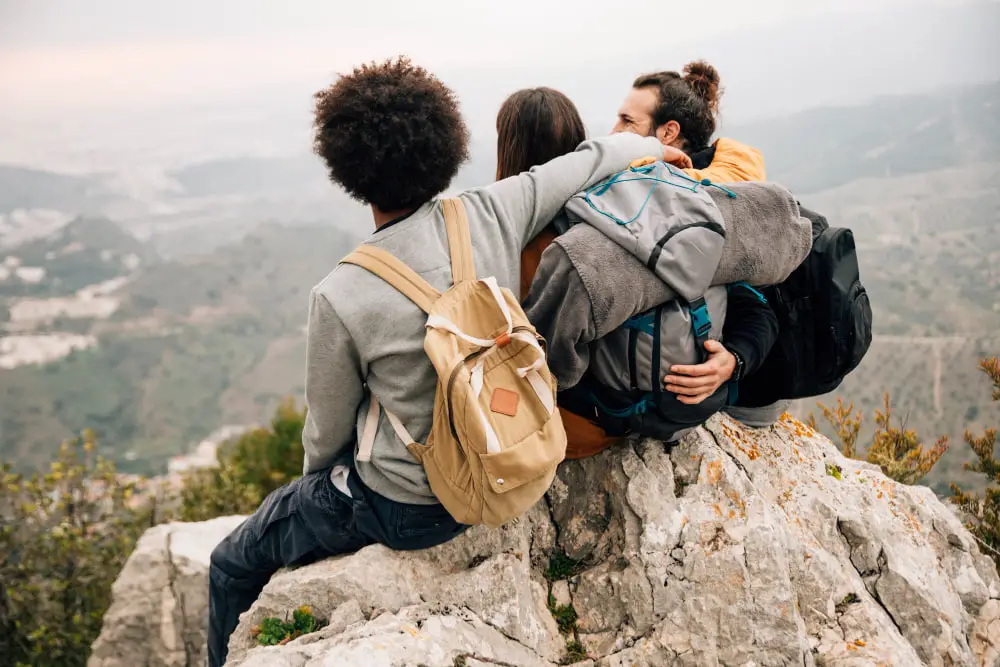The Surprising Benefits of Hiking: Unlock a Healthier And Happier You

Hiking offers a range of benefits that extend beyond just physical fitness. From enhancing cardiovascular health to improving mental well-being, the advantages are numerous and significant. Whether you’re a seasoned hiker or just starting out, understanding these benefits can motivate you to make hiking a regular part of your routine.
Physical Health Benefits of Hiking

Hiking can significantly boost cardiovascular health. Regular physical activity, like hiking, improves circulation and lowers blood pressure. It’s recommended to aim for at least 150 minutes of moderate exercise per week, which hiking can easily provide. Your VO2 max, the measure of how well your heart pumps oxygenated blood to your muscles, improves, decreasing your risk of heart disease.1
Muscles and bones benefit too. Hiking is a weight-bearing exercise, ideal for building muscle and strengthening bones. Climbing uphill activates your quadriceps and buttocks, while descending engages the muscles in the fronts of your thighs. As we age, we naturally lose bone density. Hiking can slow this loss, helping maintain stronger bones and reducing the risk of osteoporosis.
Managing weight through hiking is effective and sustainable. Hiking can burn between 400-550 calories per hour, depending on the trail’s difficulty and your weight. This caloric expenditure helps create a deficit needed for weight loss. Unlike dieting alone, hiking incorporates a physical element that promotes gradual, enduring weight loss.
Additional Physical Benefits:
- Improved coordination and balance
- Better blood sugar control for diabetes management
- Lowered blood pressure (up to 10 mm Hg reduction in systolic pressure)
- Joint-friendly exercise for arthritis sufferers
- Increased spine bone density (up to 6% in 9 months for women with osteoporosis)2
The natural endorphins released during hiking combat anxiety and improve your mood, benefiting both body and mind.
Mental Health Benefits of Hiking

Hiking offers numerous mental health advantages. One of the most significant benefits is the reduction of anxiety and depression. When you engage in physical activity like hiking, your body releases endorphins, which are natural mood lifters. These chemicals interact with receptors in your brain to reduce the perception of pain and trigger a positive feeling in the body.
The tranquility and beauty of natural environments can have a profound impact on your mood. Studies show that spending time in nature reduces rumination, which is the repetitive focus on negative thoughts—a common symptom in both anxiety and depression.3
Cognitive function also sees a boost from hiking. The combination of aerobic exercise and mental engagement—like finding your way and observing the surroundings—stimulates brain regions associated with memory and navigation. This enhances neuroplasticity, the brain’s ability to form new neural connections, improving memory and learning capacities.
“Forest bathing,” which originates from Japan, involves immersing oneself in a forest environment. Research has found that this practice significantly lowers levels of cortisol, the stress hormone, leading to reduced stress levels and heightened mental well-being.
Being outdoors also affords exposure to natural light, which is beneficial for regulating sleep patterns. Natural light influences the body’s circadian rhythms, helping to manage the sleep-wake cycle. Improved sleep, in turn, contributes to better mental health.
Hiking can be a social activity, promoting a sense of community and belonging. Engaging with friends or meeting new people on trails can foster supportive relationships and shared experiences, which contribute to overall happiness and mental resilience.
Exploring nature and achieving hiking milestones also boosts self-esteem and confidence. Facing challenges like steep inclines or long trails and overcoming them reinforces a sense of accomplishment and personal strength.
Social and Relational Benefits of Hiking

Hiking nurtures social and relational health. Engaging in outdoor ventures with friends, family, or groups can significantly strengthen social bonds and provide a sense of community.
Traversing trails together creates opportunities for teamwork and mutual support. The shared effort enhances the sense of connection among participants, deepening relationships and developing a support system.
The serene environment allows for open dialogues, helping individuals bond on a more profound level. Introducing children to hiking strengthens family ties, promoting quality time and providing a platform for parents and children to connect. For couples, hiking can serve as a unique and enriching date option, fostering teamwork and enhancing emotional intimacy.
Benefits of Group Hiking:
- Increased social network
- Regular social outlet
- Strong sense of belonging
- Alleviation of loneliness and social isolation
Hiking can be a great team-building exercise for coworkers or professional peers. The relaxed outdoor setting encourages creativity and collaboration, which can translate positively into the workplace.
Inclusivity is one of the standout attributes of hiking. Trails exist for all skill levels, ensuring that nearly everyone can participate regardless of age or fitness level.
Preparing and planning for hikes together requires collaboration and decision-making. This shared responsibility fosters trust and mutual respect, reinforcing the bonds between participants.
Practical Tips for Hiking

Starting your hiking journey requires careful planning and preparation. Here are some practical tips to get you started:
Essential Equipment:
- Footwear: Proper hiking boots with good ankle support and sturdy grip
- Clothing: Dress in layers using moisture-wicking fabrics. Bring a lightweight, waterproof jacket
- Backpack: A well-fitted backpack to carry essentials
- Hydration and Nutrition: Plenty of water and nutrient-dense snacks
- First Aid Kit and Safety Gear: Basic first aid supplies, multi-tool, whistle, and flashlight
Choosing a Trail:
- Research trails that match your fitness level using websites, apps, or local park information
- Consider elevation gain, distance, and weather conditions
- Consult local hikers or park rangers for current trail conditions and potential hazards
Safety Tips:
- Use the buddy system when possible, or inform someone about your plans if hiking alone
- Stay on marked trails and follow trail etiquette
- Bring physical navigation tools in addition to digital ones
Physical Preparation:
Condition your body with regular cardio exercise, strength training, and shorter hikes. Perform warm-up and cool-down stretches to prevent muscle soreness.
Expert Recommendations:
- Start early to enjoy cooler temperatures and allow more time
- Take time to observe and appreciate the natural surroundings
- Document your hike through photos, journaling, or GPS tracking apps
Remember, careful preparation and intelligent planning are key to a rewarding and safe hiking experience. With these practical tips, you’re well on your way to becoming a competent and enthusiastic hiker.
In essence, hiking enriches both body and mind. By incorporating it into your lifestyle, you stand to gain physical strength, mental clarity, and social connections. The journey itself is as rewarding as the destination.
REFERENCES
- Physical Activity Guidelines for Americans, 2nd edition. U.S. Department of Health and Human Services; 2018.
- Brooke-Wavell K, Jones PR, Hardman AE. Brisk walking reduces calcaneal bone loss in post-menopausal women. Clin Sci (Lond). 1997;92(1):75-80.
- Bratman GN, Hamilton JP, Hahn KS, Daily GC, Gross JJ. Nature experience reduces rumination and subgenual prefrontal cortex activation. Proc Natl Acad Sci U S A. 2015;112(28):8567-8572.
